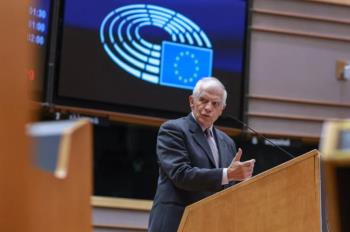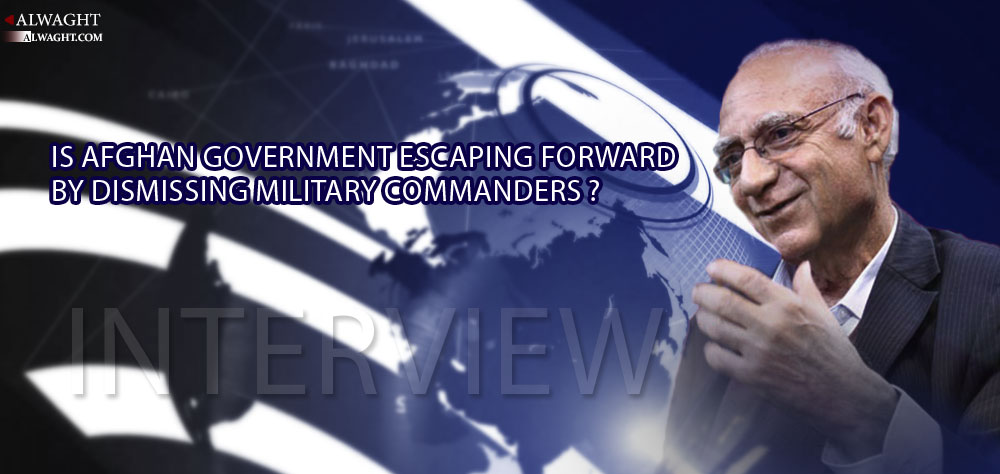Alwaght- In the past few days, the Afghan President Ashraf Ghani dismissed a number of the army commanders. The government said the move was meant to enhance the security conditions in various cities. The dismissal of the security and military officials drew various reactions at home, with some analysts arguing that the removal was ethnically and politically-motivated.
Over the past months, Afghanistan witnessed a sharp rise in the number of the suicide attacks and bombings carried out by Taliban and ISIS terrorist groups. The new wave of violence comes while the Kabul government’s efforts to start peace talks with the Taliban have gone nowhere. The failure comes while reports suggest that foreign sides are struggling to boost ISIS foothold in the war-torn Central Asian nation, which is preparing for parliamentary elections in October after eight years.
Alwaght has arranged an interview with the Indian Subcontinent affairs expert Mohammad Molazehi, about reasons behind Ghani’s measures and their influence the country’s stability in the future.
Asked about the main drive behind the army commanders’ dismissal, Mr Molazehi said that sacking of the army personnel with a direct order from the president is an inveterate issue in Afghanistan. Last year, when a suicide attack hit Kabul’s Dauod Khan Military Hospital, 10 senior police and army commanders were ousted, including the top army general Farahi. But dismissal and replacement of the security personnel by Ashraf Ghani while the crisis is raging is not a solution to the crisis.
“We have to know that Afghanistan’s security forces are now penetrable. Taliban has penetrated them via the ethno-sectarian bonds it has in the governance body. So, the key problem that the government needs to tackle is the piercing of the suicide bombers into the tightly-guarded locations which is facilitated by the security body’s penetrability.”
He continued that the public is now wondering why while Kabul’s key areas are firmly watched by the several check posts the terrorist bombings continue to rip through the capital. This is happening, Mr Molazehi added, while the government is introducing the electronic ID card system. Still, the schools, mosques, and voter and ID card distribution centers come under attacks. A number of them hit the Shiite and Hazara-inhabited neighborhoods, bringing the government under heavy reactions from the public. So, the president is under severe media and public pressures, and in the meantime, he searches a solution in sacking the military chiefs. “But the success of his measures to restore security is doubted,” the expert asserted.
Commenting on the views of Ghani’s critics who labeled his move “ethnically-motivated”, Mr Molazehi maintained that it is undeniable that some of those dismissed have ethnic bonds and non-Pashtun ethnic groups agree with this labeling.
“The non-Pashtun groups believe that the sackings conducted by the government of Ashraf Ghani have political motivations. They are far from being fully right and technical. The non-Pashtuns accuse the president of the sectarianism and his ethnic opponents argue that he is seeking to Pashtunize the power by installing in influential posts Pashtun people or those with close relations to the Pashtuns. This view now exists in the society.”
Mr Molazehi went on, saying: “From a security point of view, we can see that even the Pashtun in some periods fell victim to the purges. So, from a broader perspective, however, we cannot blame the dismissals only on the sectarian drives. In fact, the problems in Afghanistan are very complicated and sectarian. And add to this the religious and political disputes. So every action has reactions from the critics and supporters in both ethnic and religious levels. For example, if the removed army personnel is Tajik, the anti-Pashtuns complain that the move was ethnically-motivated, and vice versa. These issues exist in the country. But the main problem with the security and army forces is their vulnerability to penetration. If their structure was impervious, then things were way different now.”
Now, the top security officials like Mohammad Hanif Atmar, the national security advisor, and Mohammad Masoom Stanekzai, the National Security Council’s chief, are accused of transferring ISIS members across the country by the non-Pashtuns. Their critics suggest that the security vehicles with tinted glasses transfer ISIS members. But these claims are unconfirmed yet, though the public substantiates them and believes that as long as these people with sectarian motivations hold the power, the society should grapple with these troubles.
Asked about how Afghanistan can make it to stability and end of the security crisis, Mr Molazehi answered: “Military solution is not an option for now. Instead, they should seek a political solution, which is achievable only through dialogue. Because neither Taliban is powerful enough to seize the capital Kabul nor the government is in a position to control over 22 militant factions. So, there is an impasse, and in this situation only a political solution is necessary.”
On the other side, he continued, not all of the problems should be blamed on the Afghans. The foreign forces, US and NATO, are other parts of the problem. The fact is that in the current circumstances the Americans are directing the crisis.
“They do not want an end to the crisis. If they seriously wanted, a settlement was possible. With their 13,000 military forces deployed to Afghanistan, the Americans could force the rebels into a peace pact. But they never sought a solution.”
Moreover, the Afghanistan war is managed and it is, in fact, a proxy war. The regional and international intelligence agencies have a hand in provocation and control of the rebel factions. At the present conditions, if a solution should be devised, arrangements in three levels are needed. At a national level the ethnic and religious groups, at a regional level such countries as Saudi Arabia, Turkey, and Pakistan, and at an international level the US, Russia, and China should reach an understanding. If such an understanding is reached, then people can be hopeful of a political process and Taliban will put down arms and engage as a political party.
Gulbuddin Hekmatyar has recently proposed a roadmap, though the Taliban rejected it. If negotiations start, things could change. Hekmatyar proposed that Pashtun-inhabited regions, as well as a number of eastern and western provinces of the country, be offered to the Taliban, and in exchange the insurgent group ceases armed conflict, transforms to a political party, and pursues its ambitions via the elections, the expert held.
“This proposal can be subject to debates, though so far neither the government nor the Taliban declined to show openness to it. Taliban should take into account that it cannot lead an armed struggle against the government in perpetuity. It should seek a pact with other ethnic and political sides of Afghanistan. So, it seems that the only settlement to the Afghan crisis in the current situation is an inclusive agreement between all of the Afghan political and ethnic factions and reduction of the foreign meddling in the nation’s home affairs.”



























